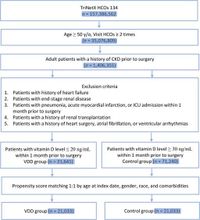A recent study has revealed significant insights into the impact of vitamin D deficiency (VDD) on postoperative outcomes among patients suffering from chronic kidney disease (CKD). The research, based on data from the TriNetX Analytics Network, brought to light how low vitamin D levels can exacerbate health risks prior to and following surgical procedures.
The study, published on March 21, examines a population of over 42,000 patients aged 50 and older, comparing those with VDD (≤ 20 ng/mL) to those with adequate vitamin D levels (≥ 30 ng/mL) within a month of surgery. Researchers identified that VDD is correlated with significantly increased risks of 30-day mortality, acute kidney injury (AKI), and pneumonia.
In the primary outcome assessment, it was found that patients with VDD had an odds ratio (OR) of 2.33 for 30-day mortality compared to their counterparts, indicating more than twice the risk of dying after surgery. Furthermore, the odds for developing AKI stood at 1.94, marking nearly double the incidence of this complication in the deficiency group. Even during the recovery observations extending to 90 days, these adverse outcomes persisted, with 90-day mortality rates reflecting similar trends.
The significance of the study is underscored by the high prevalence of vitamin D deficiency, which has been noted in up to 85.7% of patients with advanced CKD. As both chronic kidney disease and vitamin D levels are modifiable factors in the surgical landscape, the findings invigorate discussions surrounding preoperative vitamin D screening and correction as potential interventions to improve surgical outcomes.
Beyond mortality, the study also pointed to elevated risks of postoperative pneumonia in vitamin D deficient patients, with a reported increase in occurrence from 0.16% in the control group to 0.28% in the VDD group (p = 0.0087). This suggests a critical role of vitamin D in enhancing the body’s immune response and points to the vitamin’s relevance in recovery from surgical stress.
Interestingly, the study highlighted no significant differences in acute myocardial infarction (AMI) and atrial fibrillation/flutter (AF) outcomes in relation to vitamin D status. This could indicate that while vitamin D plays a protective role in certain post-surgical complications, its impact may not extend universally across all health areas.
The researchers utilized a robust design featuring propensity score matching, involving 21,033 patients per subgroup which effectively balanced the groups’ demographic characteristics. This step ensured that the findings were not skewed by confounding factors, reinforcing the statistical validity of the results.
The research also detailed subgroup analyses assessing variations in the impact of vitamin D deficiency across sexes and CKD stages. It indicated that males showed a slightly higher risk relative to females when it came to postoperative mortality associated with VDD, reinforcing the need for tailored approaches in managing vitamin D levels in distinct demographics. In advanced CKD stages, VDD indicated stronger associations with mortality and AKI, reinforcing its critical significance in this patient population.
As vitamin D is known to support various biological functions, including immunomodulation and inflammation regulation, the implications of this research are significant for surgical practitioners. It offers a potential pathway for improving outcomes in at-risk populations through simple yet effective nutritional interventions.
Based on these findings, the authors advocate for a structured approach to preoperative screenings of vitamin D levels coupled with corrective measures to optimize patient health and minimize surgical complications. This strategy not only may improve short-term surgical success but could also enhance long-term patient quality of life.
Overall, this study accentuates the importance of vitamin D as a vital nutrient in managing the health of patients with CKD, particularly when surgical interventions are involved.

